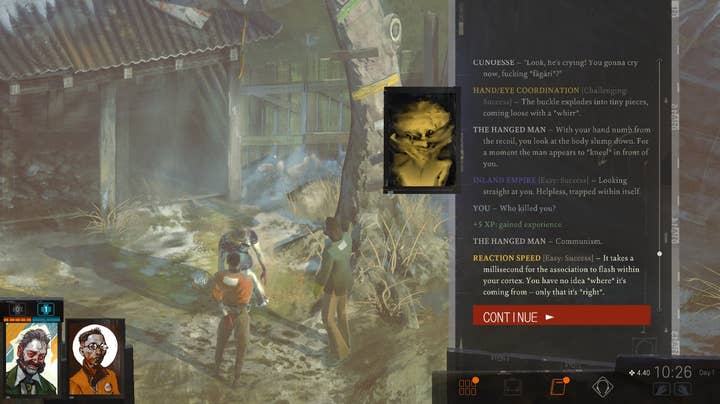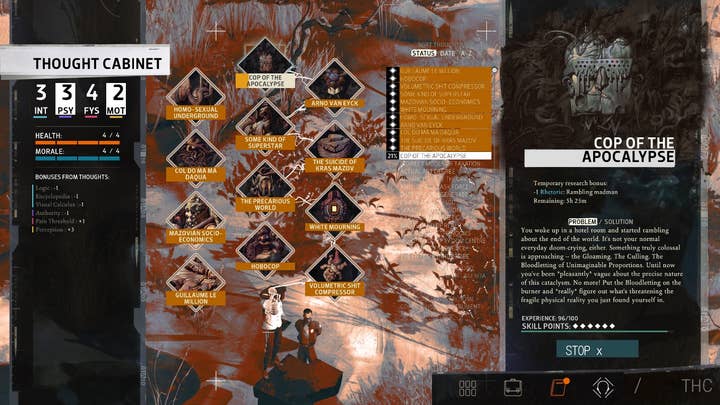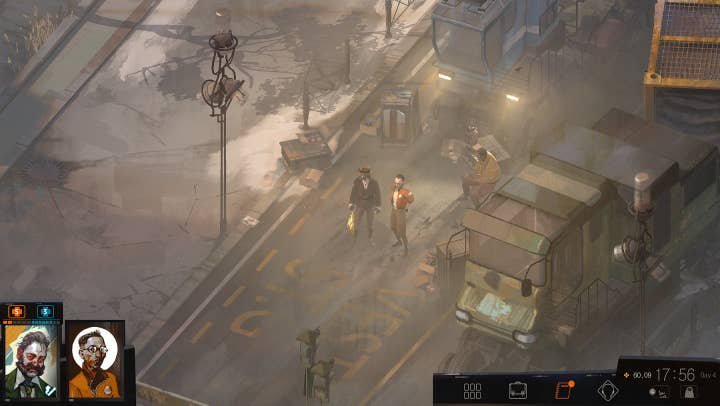Disco Elysium | Why I Love
Benedict Lee examines how ZA/UM's RPG tackles character development and identity building in new and insightful ways
Why I Love is a series of guest editorials on GamesIndustry.biz intended to showcase the ways in which game developers appreciate each other's work. This entry was contributed by Benedict Lee, developer of modular synthesizer-inspired puzzle game The Signal State, which launches next week.
Disco Elysium doesn't quite begin with the literal birth of your character. No, of course not, that would be way too obvious (*ahem* Fallout 3). Instead, it begins with a psychological rebirth. You (or more specifically, your character Harry Du Bois) wake up, amnesiac and hungover. Your very first choice in this game is whether to even acknowledge reality's existence. Should you open your crusty eyes to the blurred lights of your trashed hotel room? Or sink ever deeper into the black ethanol-laden primordial blackness, remaining a formless soul? Either way, reality calls and you are forced to awake.

Not many games choose to announce themselves in this manner. Much has been said and written about the rich political themes and perspectives embedded in Disco Elysium, but the game does not begin with politics. It begins with the acknowledgement of being. What do you choose? Being? Or nothingness? Everything else stems from this. This is what I find so incredible about Disco Elysium: the intricate systems within that systemize being a person, with a unique identity, history and beliefs.
At the beginning, the game also introduces us to its core system: dialogue. The dialogue system is the game's keystone. All other systems revolve around it. It is the interface by which you interact with the world, not just the means by which you speak, but also the means by which you act. It does not exist or function in isolation. Before you even begin Disco Elysium, you are instructed to create your character by assigning skill points to a list of 24 separate skills in four distinct categories. Some of these skills, like Hand-Eye Coordination, have obvious practical applications. Others, like Esprit De Corps, are somewhat more oblique.
Their function and application become clear as you continue in the game. As you engage in conversations and interactions with other characters and the wider world, these skills push you in specific directions. Disembodied voices, subconscious manifestations of your skills, interject between lines of dialogue, giving context and new information or illuminating new potential tangents in the conversation.

For example, when removing the body of the man whose murder you are investigating, there is a possibility, given the right character build, that your Inland Empire skill speaks up, allowing you to engage in an imaginary conversation with the murder victim. You ask him, who killed him? He responds. Communism. With a high enough Reaction Speed skill, the tangent goes deeper. Another voice speaks up: the answer feels right.
Conversations in Disco Elysium aren't just back-and-forths between characters. Buried beneath every conversation is a myriad of hidden tangents and detours, waiting to rise up given the right moment and the right character build.
These interjections highlight an important realization that ZA/UM, the developers of Disco Elysium, made about RPGs: playing a role isn't just about inhabiting a new body or a new voice. It's also about inhabiting a new mind. In the many RPGs that came before Disco Elysium, in-game conversations were pure text. Subtext was left for players to infer. The natural outcome was that players would bring about their own perspectives, knowledge, and prejudices when inferring meaning from these conversations. The voice may differ, but the mind is the same. In the end, you do not play a role. You merely play yourself in a different world.
With the skills-based interruptions and interjections inherent in Disco Elysium, the inferences and subtext are given to you, but the game is no less engaging for it. Depending on your character's build, you are presented with perspectives and conclusions that frequently challenge or contradict your own. New ideas and new possibilities that lie outside your own mental horizon are presented to you. Inland Empire told you that the murder victim was killed by communism. What is your response?
The question is not purely rhetorical. Disco Elysium remembers the conversational choices you made. It observes you, and when the time is right, you are prompted with a thought. For instance, apologize frequently enough for your past alcohol-induced sins, and your subconscious points this out to you.

Here we are introduced to Disco Elysium's Thought Cabinet. The Thought Cabinet is perhaps Disco Elysium's most unique system. Based on the choices that the player has made throughout their playthrough, they are presented with prompts for new thoughts. Players can then accept these thoughts and choose to add these to their Thought Cabinet. Once added, the player character spends time contemplating these thoughts and once the allotted time has passed, the thought takes final form, unlocking skill bonuses (or penalties) or new information and conversational choices.
The introduction of the Thought Cabinet forms the final puzzle piece forming Disco Elysium's core mechanical loop. Players make conversational choices. Their skills interject as disembodied voices. Players make more conversational choices based on the subtext presented. Eventually these choices lead to thoughts. Players process the thoughts, leading to new skills and information. With these unlocked, players continue to make even more conversational choices. The cycle then repeats.
This is the heart of Disco Elysium: a feedback loop that leads to the development and growth of your player character's identity. By that same token, is it not also the loop by which we develop our own identities?
Considering this loop, it might be worth asking: does player choice stop mattering eventually? Will your character's identity ever be so developed that player choice becomes so heavily steered one way and thus become irrelevant?
Disco Elysium answers this with a resolute no. The game always presents you with a clear opportunity to interrupt this loop. Whenever you are prompted with a new thought, the player can make the explicit choice to refuse this thought. For instance, make capitalist-leaning comments frequently enough and you are presented with the Indirect Modes of Taxation thought. Choosing to accept and process the thought would make you a 'capitalist cop.' However, this thought is not forced upon you. You can choose to refuse it. It will not be added to your Thought Cabinet without your consent.
If the skill system is Nature (and even those can change slowly over time), then the Thought Cabinet is Nurture. You choose who you become. No matter what your past was like or what skills and deficiencies you were born with, the ultimate arbiter of your identity, of your beliefs, ideas, and perspectives, is you.
What I love about Disco Elysium is how it holds a mirror up to our faces, to show us our ugliness, but also to show us our ability to fix ourselves. To play Disco Elysium is to play a new life. Through its systems we see the patterns of behavior that led us to become who we are. It reminds us that even in a world that we are powerless to change, we are the masters of our own identities. Like your character Harry, it is never too late to step away from the freefall into alcoholism, fascism, or depression. Like Harry, it is never too late to be reborn.
Developers interested in contributing their own Why I Love column are encouraged to reach out to us at news@gamesindustry.biz.
